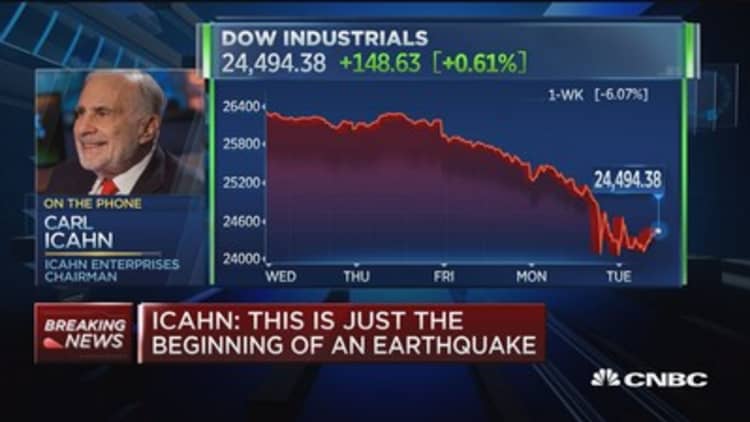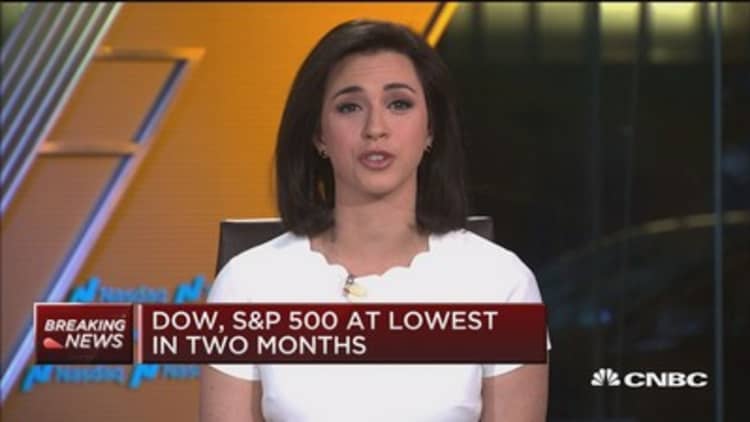
Credit Suisse said it will end trading in a security that some investors believed was exaggerating movements in volatility futures markets and even the overall stock market.
The last day of trading for VelocityShares Daily Inverse VIX Short-Term exchange-traded note (XIV) will be Feb. 20, according to an announcement from Credit Suisse. The bank is triggering this liquidation because the product during these last three volatile days could not keep up with the scenario it was supposed to track: a calm market.
The XIV security, which had fallen roughly 85 percent in after-hours trade Monday, resumed trading Tuesday, closing down 93 percent.
The security is supposed to give the opposite return of the Cboe Volatility index (VIX), the market's widely followed turbulence gauge. The VIX's value exploded higher, topping 50 Tuesday, which in theory should have wiped out most of the value of the VelocityShares ETN.
Multiple exchange-traded securities that are also supposed to be bets on calm markets were halted Tuesday after losing the majority of their value overnight.
Credit Suisse said late Monday ET that the XIV's plunge would have no "material impact" on the Swiss bank itself. Shares of Credit Suisse slumped nearly 4 percent on Tuesday morning amid the wider sell-off in equity markets.
Other volatility-related funds, including the ProShares Short VIX Short-Term Futures (SVXY), have also fallen precipitously.
ProShares told clients in a release Tuesday morning that "the performance on Monday of the ProShares Short VIX Short-Term Futures ETF (SVXY) was consistent with its objective and reflected the changes in the level of its underlying index."
The ETF resumed trading late Tuesday morning, falling 83 percent by the close.
"That's the instrument that's going haywire," Jim Cramer said Monday during a CNBC special report, referring to the XIV. "It is blowing up as we speak."
"It should put downward pressure on the stock market at the opening, should spike the VIX to 50 and then cause the market to go down," he said Monday.
After the liquidation announcement from Credit Suisse, the value VIX dropped from the 50 level.

To be sure, the VelocityShares Daily Inverse VIX Short-Term exchange-traded note only has $1.9 billion in assets so the direct exposure risk did not appear to be large.
As explained in the VelocityShares prospectus, the company can elect to "accelerate" any of their ETNs, liquidating them early.
"If the price of the underlying futures contracts increases by more than 80 percent in a day, it is extremely likely that the Inverse ETNs will depreciate to an Intraday Indicative Value or Closing Indicative Value equal to or less than 20 percent of the prior day's Closing Indicative Value and will be subject to acceleration," read the company prospectus. "If an Acceleration Event occurs at any time with respect to any series of the ETNs, we will have the right, and under certain circumstances as described herein the obligation, to accelerate all of the outstanding ETNs of such series."
The drop also raised fears of big losses from hedge funds and other investors unfortunate enough to be holding this security and unable to unwind it.
It is hard to tell who is exactly holding this short-term oriented security at this time. Previous SEC filings show Credit Suisse, Deutsche Asset Management, Citadel Advisors, Flow Traders, and Two Sigma as the top holders.
But those old filings should not be seen by investors as indicative of the hedge funds' current positions. The funds may not be holding the security at all today since they trade in an out of these vehicles frequently.
Both Citadel Advisors, Deutsche Asset Management and Morgan Stanley declined to comment.
"Today's large increase of market volatility will clearly contribute to further outflows from systematic strategies in the days ahead (volatility targeting, risk parity, CTAs, short volatility)," J.P. Morgan's Marko Kolanovic said Monday. "The total amount of these outflows may add to roughly $100 billion, as things stand."
— CNBC's Leslie Picker contributed to this report.


